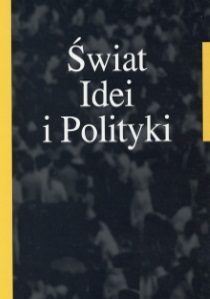Revolution of nihilism. National socialism and political realism in Hermann Rauschning’s thought
DOI:
https://doi.org/10.34767/SIIP.2017.16.04Keywords:
national socialism, political realism, Hermann Rauschning, theory of politics, practical politics.Abstract
The article deals with the political realism of Hermann Rauschning. Briefly discussing the historical backgrounds of Rauschning’s views, the theory of political realism with its version in the German author, the distinction of two types of realism, and the compilation of theory and practice. The author wanted to emphasize the defensive character of the Rauschning’s realism aimed at defending the state of possession before the National Socialist revolution. Rauschning did not require realists to create new approaches- it was based on the premise that continuing the policy of peaceful development of relations between
states would sustain a prosperous situation. In the topic of two types of realism, Rauschning listed the perfect realism, based on the previously mentioned defense of state of possession and national-socialistic realism, which was based on subordinating the rules of political action to abstract purposes. According to Rauschning, such action distorted the sense of realism, because on the one hand it blurred the boundary between real policy conditioning and ideological flattening; On the other hand, it provided the opportunity to pursue a political scenario that was incompatible with the vital interests of the community, which fell under the jurisdiction of the authority. The author also listed extensively the dangers associated with the distorted use of the determinants of the theory of realism, which led to the loss of primordial significance by universal political concepts.
References
Bauman Z., Lyon D., Płynna inwigilacja, Warszawa 2013.
Bocheński A., Historia i polityka, Warszawa 1989.
Bullock A., Hitler. Studium tyranii, Warszawa 2004.
Dopierała B., Gdańska polityka Józefa Becka, Poznań 1967.
Gehlen A., Człowiek. Jego natura i miejsce w świecie, Toruń 2007.
Gehlen A., W kręgu antropologii i psychologii społecznej, Warszawa 2001.
Gulczyński M., Nauka o polityce, Warszawa 1984.
Jasienica P., Rozważania o wojnie domowej, Warszawa 1967.
Kaczmarek B., Polityka jako artykulacja interesów, [w:] Metafory polityki, red. B. Kaczmarek, Warszawa 2001.
Kimla P., Historycy-politycy jako źródło realizmu politycznego, Kraków 2009.
Realizm polityczny. Przypadek polski, red. J. Kloczkowski, Kraków 2009.
Löw P., Gdańsk. Biografia miasta, Kraków 1987.
Makuch A., Problemy państwa i władzy w myśli społeczno-politycznej krakowskich konserwatystów w latach 1866−1895, Warszawa 2013.
Mannheim K., Ideologia i utopia, Warszawa 2009.
Morgenthau H., Polityka między narodami, Warszawa 2010.
Nye J., Soft Power. Jak osiągnąć sukces w polityce światowej – perswazyjne środki oddziaływania politycznego (kultura, propaganda, dyplomacja), Warszawa 2007.
Rauschning H., Rewolucja nihilizmu. Kulisy i rzeczywistość Trzeciej Rzeszy, Warszawa 1996.
Rauschning H., Rozmowy z Hitlerem, Warszawa 1994.
Schieder T., Hermann Rauschnings Gespräche mit Hitler als Geschichtsquelle, Düsseldorf 1972.
Schmitt C., Teologia polityczna i inne pisma, Warszawa 2000.
Tatarkiewicz T., Historia filozofii I, Warszawa 2004.
Tukidydes, Wojna peloponeska, Warszawa 2003.
Vuillerme J.L., Lustro Zachodu. Nazizm a cywilizacja zachodnia, Paryż 2016.
Weber M., Polityka jako zawód i powołanie, Kraków 1998.
Weres L., Teoria gier w amerykańskiej nauce o stosunkach międzynarodowych, Poznań 1982.

